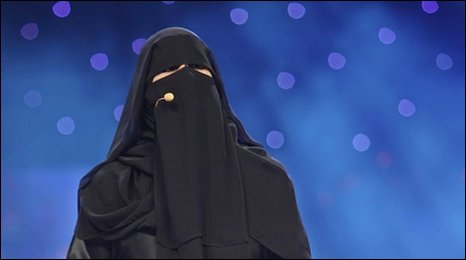Hissa Hillal, eine saudische Dichterin (und frühere Literaturredakteurin für die Tageszeitung al-Hayat) hat bei einem Wettwebewerb nach dem Motto „Arabien sucht den Superdichter“ Aufsehen erregt. Sie trat voll verschleiert im Fernsehen auf und schleuderte den religiösen Stützen der Gesellschaft ihre Verse entgegen.
Ich zitiere aus dem Bericht der BBC:
Using a traditional verse form native to the Arab Peninsula’s nomadic tribes, she writes critically about the country’s hard-line Muslim clerics, calling them: „vicious in voice, barbaric, angry and blind“.
Condemning the violence that she says lies beneath their religious messages, her poems speak of some of the clerics „wearing death as a robe cinched with a belt“ – an apparent reference to suicide bombers‘ explosives belt.
Her poems rail against what she sees as a dangerous and excessively conservative shift in Arab society and mores, from within a country where women cannot travel without a male guardian and are forbidden from driving.
|
Hissa Hilal
|
„What made me so angry is seeing the Arab society becoming more and more kept to itself, not like before – loving and caring and sharing and open and welcoming everyone,“ she told the BBC’s World Service.
„Most of the people loved what I said, from their hearts. They think I am very brave to say so, and that I said what they feel in their hearts.“
She explains the apparent contradiction in the fact that she advocates women’s rights while wearing the full veil – which some suggest is a symbol of female oppression: „Covering my face is not because I am afraid of people. We live in a tribal society and otherwise my husband, my brother will be criticised by other men.“
While her poetry is intended for a wide audience, the act of covering herself, she says, is out of understanding for her male relatives.
„I know they love me and they support me. It’s a big sacrifice for them in such a society to let me go to the TV and talk to the media. I am hoping my daughters won’t have to cover their faces and they’ll live a better life,“ she said.
